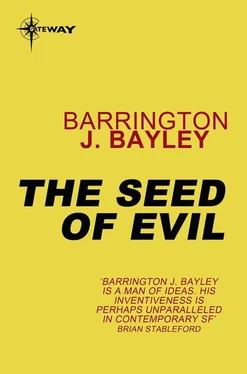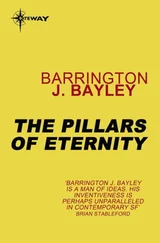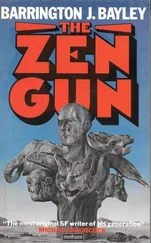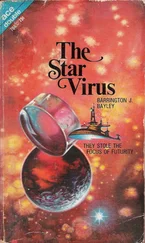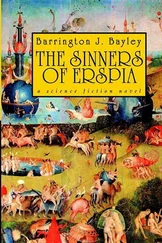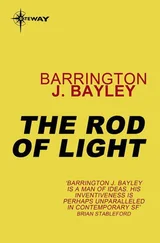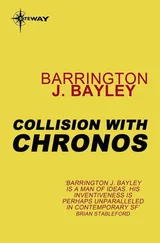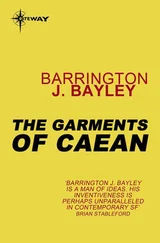“It’s not possible,” I answered. “Believers are unanimous on that score. He is impalpable, transcendent.”
Rodrick looked at me intently, with that small, tight smile of his that meant he was leading up to something. “They are quite mistaken,” he said firmly. “What you are quoting is the shoddy superstition of the worshipper, the cringing obeisance he adopts towards the creator. The point is, I have never yet studied an account of the creation, whether mythical or metaphysical, that managed to do without some connection between the creator and the created. Since the universe is physical, it follows that this connection must, necessarily, be of a physical kind.”
He swallowed his rum and coke before continuing. “Do you see where I am leading? It all means that God shares some of the properties of matter. Not that he’s material in the same sense that we are—though one sect, the Mormons, teach that he is—but he must possess some material characteristics. Substantiality without extension, perhaps, or not even substantiality as such, but at any rate something, otherwise he wouldn’t have been able to arrange for the creation of a physical universe.”
Rodrick prodded a finger at me. “And as you know, there’s no such thing as a purely one-way physical arrangement. If he was able to create us, there must be some way we can hit back at him. God can be killed, even.”
I snorted. “Preposterous!”
For reply Rodrick indulged in one of his theatrical gestures I often find irritating. He rose abruptly to his feet, without a word to me, and strode for the door, leaving me to trail along after him.
He was already some yards up the street before I caught up with him. I asked, somewhat annoyed, where we were going.
“To kill God,” he answered doggedly.
His pace did not falter and I, weakling that I am, fell in step beside him.
Certain impressions of that evening remain in my memory. The warmth of the night, the vanished sunset that still left a lingering after-glow. Rodrick’s half-timbered house, like a dark mass; Rodrick’s lean face, wolf-like in the light of shaded cresset lamps as we mounted the staircase that led to the upper floor. One of Rodrick’s cleaning robots had fallen from its guide-rails and lay broken on the tiling below. It was ignored by its brothers, who continued to purr clumsily about their business.
Rodrick kept up a constant expatiation during the short walk. “You see, our space-time must be in contact with the creative principle at all points. That principle must in turn emanate directly from the deity. Discover that principle and learn to control it, and you have a weapon to which God is susceptible, and which can be aimed from any point within the creation.”
“Are you serious? ”
“Perfectly.”
Either Rodrick was joking or he was paranoid, I decided. But I asked: “If you were to destroy God, wouldn’t the universe disappear?”
“Ah, you stand revealed as a pantheist!” Rodrick declared dryly. “You subscribe to the Vedantic view that the universe is an aspect of Brahman, or God, and is indistinguishable from him. I’m fairly sure the cruder, Christian view is the correct one. The universe is distinct from God, produced by an act of will, and therefore is capable of an independent existence.” He waved a hand. “Just as those buildings have outlasted the men who built them.”
Now we were in Rodrick’s laboratory, and I gazed around as he switched on the lights. An elaborate framework had been constructed on the main workbench. A number of lasers—presumably those Rodrick had mentioned purchasing—were bracketed into it, in a manner that suggested a carefully conceived pattern. Distributed through the framework, like the fruits of a bizarre tree, were mirrors, lenses and prisms.
Beyond the windows there seemed to stretch an endless menacing abyss. It struck me how sinister was the atmosphere of the workshop, with its timber rafters and clumps of grime (the house automata were not admitted here). It was more like the laboratory of a medieval alchemist than of a twentieth-century man of science. The apparatus was modern, of course, but the dim lamps created countless dark corners, and it struck me that Rodrick could have arranged the lighting better.
“All right,” I said, “granted for the moment there is a physical principle by which one might gain access to God, supposing him to exist, how would you ever locate such a principle?”
“Perfectly simple, as it happens,” Rodrick said blandly. “That information has been available for at least three thousand years. ‘And God said, Let there be light: and there was light.’ Book of Genesis, verse three. And a remarkable insight on the part of the writer, if I may say so.”
Rodrick moved around the workbench to examine the lasers from all angles and began to check the alignments of his contraption with a digitised micrometer. While working he kept up a continuous low-toned monologue. “It’s obvious, once you think about it. The tool God used to construct solid matter, to unroll space and time, was light. That’s why it has such peculiar properties—why its velocity is constant for all observers, contrary to the expectations of Michelson and Morley, and also why it’s the basis of all energy exchange. But we don’t want the ordinary light that just goes zipping endlessly through space; that’s no good to us at all. We need light that can reverse its direction, as it were, that can become intense enough to implode, so to speak, and cross the threshold back into the pre-creation state… At this point we come to the fact, which is very interesting, that while the velocity of light is constant for all observers, it is not constant for all media. Inside a material environment it slows down. In diamond, for instance, its velocity is a mere seventy-seven thousand miles per hour—a bare two-fifths of its velocity in vacuo. What velocity, I asked myself, would light adopt in a medium composed entirely of light? The answer is that it would have no velocity at all, since it would only have itself to measure that velocity by.”
He switched on an oscilloscope. “Well, the next step is to arrange this special environment: an environment of pure light. It should be possible, I reasoned, to bring about a self-reflecting pattern of coherent light which would reinforce itself indefinitely, and that would transcend the space-time barrier. I admit I made some use here of certain mystical diagrams such as the Kabbala, which incidentally also describes existence as proceeding from out of light—‘limitless light’. The enneagram, an old Sufi symbol, was even more useful; it possesses cybernetic properties the Kabbala lacks. Be all that as it may, I can now announce the problem to be essentially solved. I have light that can hurtle back to its original source—very special, very dense light. You find the adjective incongruous? To us, of course, light is the most tenuous of substances, but to God it must seem solid and palpable. It is, after all, what he used to manufacture everything else. And if it comes to that, natural light only seems tenuous to us because it is constantly dispersing. Do you know there are lasers now that can produce a light pressure of two and a half million atmospheres? The ray gun is already with us.”
Having delivered this feverish lecture and finished his adjustments, Rodrick straightened and stared at me triumphantly. “I calculate that this device will produce a rod of radiation which will strike God like a bolt of hardened steel. What we have here is also a ray gun of sorts, Harry. The ultimate gun!”
Believing that I was only humouring Rodrick in his little fantasy, I asked: “But why should anyone want to do such a thing?”
Читать дальше
